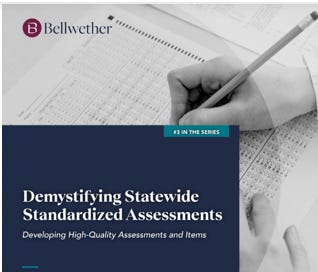A Little T&A. (Testing And Assessment, C’mon People…)
Testing is more interesting than you might think...but you have to surprise them, show them.
The debate over standardized testing is an odd one. It’s highly political, often divorced from the facts. But that’s hardly unusual in education – and other issues.
What strikes me, in addition to the pervasive lack of appreciation for how these assessment systems work and why, is that testing and accountability proponents generally like tests much less than their critics think they do. It’s more of a Churchill and democracy kind of sentiment. A lot of people don’t realize that the information and quality assurance yield for pennies on the dollar is the envy of most industries. And almost everyone, frequently the media spoon fed by activists, underestimates the generally broad support for assessment among the general public and especially parents. People want to know how their kids are doing in some comparable way.
Bellwether recently released six primers on major elements of assessment practice. They are not intended to convince you that testing is great. Some of this is a values debate and some of this is, as yesterday’s post mentioned, a ‘for what purpose’ debate.
And there is plenty of room for nuance. I have some concerns about high stakes testing for kids, but also think employing scores aggregated at the classroom, school, district, and state level can provide important analytic leverage.
Others disagree. And that’s all fine and healthy insofar as that debate is grounded in how these things actually work rather than misinformation or caricatures. That’s the point of these new Bellwether briefs, which were funded by a consortia of assessment providers, not to convince but to inform. They look at how assessments are designed, special populations, comparability, reporting, and other key issues:
Ensuring That Assessments Accurately Measure Academic Standards
Making Assessments Accessible for Students With Disabilities and English Learners
As with all work that carries our byline or brand, we retained absolute editorial control so nothing in these briefs should be attributed to any entity or anyone other than the authors.
Bellwether’s Michelle Croft, an actual psychometrician, and I sat down to talk about some of the issues.
Previously on this issue: Here’s a 2021 look at testing. Here’s Shilpi Niyogi on testing. Here’s Anne Wicks. And here’s Jenn Schiess, Bonnie O’Keefe, and me for NASBE on the broader issues.
We haven’t had music in a bit, so here are the Chainsmokers.




